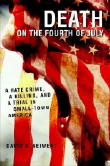Spyhopping the Right.

David Neiwert is a freelance journalist based in Seattle. He is the author of Strawberry Days: How Internment Destroyed a Japanese American Community (Palgrave/St. Martin's Press, June 2005), as well as Death on the Fourth of July: The Story of a Killing, a Trial, and Hate Crime in America, (Palgrave/St. Martin's, 2004), and In God's Country: The Patriot Movement and the Pacific Northwest (1999, WSU Press). His reportage for MSNBC.com on domestic terrorism won the National Press Club Award for Distinguished Online Journalism in 2000. His freelance work can be found at Salon.com, the Washington Post, MSNBC and various other publications. He can be contacted at dneiwert@hotmail.com.

Sara Robinson has worked as an editor or columnist for several national magazines, on beats as varied as sports, travel, and the Olympics; and has contributed to over 80 computer games for EA, Lucasfilm, Disney, and many other companies. A native of California's High Sierra, she spent 20 years in Silicon Valley before moving to Vancouver, BC in 2004. Her lifelong interest in the social effects of authoritarianism have most recently led her to pursue the MS in Futures Studies at the University of Houston. She's also a student member of the Association of Professional Futurists, and member of the Accelerated Studies Foundation advisory board on social and cultural issues. For fun, she raises kids and travels. You can reach her at srobinson@enginesofmischief.com.
Sara's recent series:
Cracks in the Wall: Parts I, II, and III.
Tunnels and Bridges: Parts I, II, III, and IV, plus a Short Detour.
Dave's recent series:
The March of the Minutemen
Intro: Parts 1, 2, 3, 4, 5, and 6.
Unhinged: Unhonest
Parts 1, 2, 3, 4, 5, and 6.
___
Other books by Dave [limited availability]:


"The Rise of Pseudo Fascism": An essay
Available in Adobe PDF format here
Support independent journalism:
Suggested $5 donation

Original posts: Part 1, Part 2, Part 3, Part 4, Part 5, Part 6, and Part 7.
______
Choice essays:
____
"The Political and the Personal"
____
"Bush, the Nazis and America":
Parts 1, 2, 3, and 4.
_______
Rush, Newspeak and Fascism: An Exegesis
[PDF file]
[Suggested $5 donation]
[In HTML: Parts I, II, III, IV, V, VI, VII, VIII, IX, X,, XI, XII, XIII, XIV and XV. See explanatory note.]
[Also available in HTML, and with art, at Cursor.]

_______
Orcinus Principium No. 1
Orcinus Principium No. 2
Why Orcinus?
|
|
| |
|
|
| |
|
|
|
|
|
|
| |
What! Another break?
Friday, July 09, 2004
I've been working on a longer post, but my clock has run out. I'm out of town for a family reunion for the next several days. Look for some fresh material next Wednesday or so.
In the meantime, let me recommend everyone check out a post my friend Rob Salkowitz at Emphasis Added wrote last week titled "Defining Dissent Down," which neatly sums up a number of thoughts I think many of us have had in recent weeks. Rob's an excellent writer with keen insight, so be sure to check out the rest of his site too.
1:22 AM
Spotlight
The psychological combat field
Tuesday, July 06, 2004
It's one thing to realize you've been had. But even more important, perhaps, is to realize why it's happened.
The natural reaction that most people have to the discovery that the shots of the statue of Saddam coming down in Baghdad as Americans took control were not, in fact, a spontaneous demonstration, but were part of a carefully staged event for the TV cameras, is one of simple disgust -- to remark, as Atrios did the other day, that the incident reveals what suckers the Bush administration has played the public for.
Even more disturbing, however, is to read the L.A. Times report carefully and observe that this project was specifically a product of the Pentagon's "psychological combat" program:
- The Army's internal study of the war in Iraq criticizes some efforts by its own psychological operations units, but one spur-of-the-moment effort last year produced the most memorable image of the invasion.
As the Iraqi regime was collapsing on April 9, 2003, Marines converged on Firdos Square in central Baghdad, site of an enormous statue of Saddam Hussein. It was a Marine colonel -- not joyous Iraqi civilians, as was widely assumed from the TV images -- who decided to topple the statue, the Army report said. And it was a quick-thinking Army psychological operations team that made it appear to be a spontaneous Iraqi undertaking.
Psychological operations -- or "PsyOps," as they are known in lingo -- are the subject of a multitude of conspiracy theories, in no small part because they are in fact cloaked in so much official secrecy. Much of the accusatory material that circulates about the programs is bogus, but there are serious scholars who have examined it and remain useful sources of what we do know about them. (A reasonably factual collection of documents can be found at The Information Warfare Site, while this Wikipedia page can give you a quick rundown on what's known.)
One of these scholars is Christopher Simpson, the American University professor who has written extensively on the subject, notably in Science of Coercion: Communication Research and Psychological Warfare 1945-1960 (an excerpt of which you can read here).
One of the important points that Simpson raises is that the combat field for psychological warfare is not merely the physical field of combat, but the home front as well. In an interview with Simpson, he discussed this point a little further:
- From its inception psychological warfare has been the mating of violence on the one hand and what people would call today propaganda or mass communication on the other hand. Another thing that's interesting about psychological warfare, from its inception it has also targeted the people of the United States, the common preconception is that for better or for worse this is something we do to them. The reality is that from the government's standpoint, from the standpoint of those who are paying the bills for its development the targets always involve not only foreign audiences but domestic audiences as well.
We have in fact known from even before the outset that the war against Iraq would prominently feature psychological warfare. Most people have assumed that this warfare would be directed against the enemy and the subject citizens. They have not stopped to consider that, by definition, it would also be directed toward the American public as well.
This reality raises a serious concern about the fragility of democracy during wartime. Because under the aegis of a seemingly eternal war, the American government has clearly been involving the public in its psychological combat, and has hijacked the nation's press in the process. The entire meaning of the Iraq war -- and by extension, the "war on terrorism" -- is inextricably bound up in the psychological manipulation of the voting public through a relentless barrage of propaganda.
This is why the both the runup to the war and its subsequent mishandling have been so replete with highly symbolic media events -- many of them played repeatedly on nightly newscasts -- that have proven so hollow at their core, from the declarations of imminent threat from Iraq's supposed weapons of mass destruction, to phony images of Saddam's statue being torn down, to flyboy antics aboard airline carriers, to meaningless "handovers" of power. It also explains why certain important and humanizing symbols of wartime -- civilian casualties, the returning flag-draped coffins -- have been so notably absent from our views of the war.
The role of the media in this manipulation cannot be understated. The abdication of the media's role as an independent watchdog and its whole subsumation as a propaganda organ bodes ill for any democracy, because a well-informed public is vital to its functioning.
But the fact that the military establishment, in the context of the "war on terror," clearly views the American public as the subject of a psychological combat operation should give us all pause regarding the ability of democracy to withstand this kind of assault.
In the end, I think there is enough innate resistance to this kind of propagandization in a free society to win out. But the November election will be a crucial test of whether or not this is true.
10:55 PM
Spotlight
The good fight
There's some good reading to be had over at Working for Change, where Bill Berkowitz interviews my friend Daniel Levitas, author of The Terrorist Next Door: The Militia Movement and the Radical Right, on one of my favorite subjects, the failure to confront domestic terrorism. [It's a two-parter: Part I and Part 2.]
Some excerpts [from Part 1]:
- BB: What about the people who didn't quit the movement?
DL: They have become even more radicalized, more hard core. After all, they believe that the Clinton administration bombed the Murrah building on purpose -- and set up Timothy McVeigh and Terry Nichols as patsies in order to persecute the "Patriot" movement. This is the same crowd that believes that the planes used on 9/11 were remote-controlled by the Israeli Mossad and the CIA. They used the tragedy at Waco to bolster their argument. "Look," they said, "If Bill Clinton and Janet Reno could kill all those innocent Branch Davidians down in Waco, what makes you think they weren't behind the Oklahoma City bombing?" This all fit in rather nicely with fanatical gun culture and extreme religious beliefs of the radical right. After all, the Davidians were wanted on gun charges and had unconventional religious beliefs. So, for those white supremacists that worship fully automatic weapons and believe that Jews are the children of Satan, it wasn't all that difficult to convince them that the government was out to murder them, as well.
[From Part 2]
- BB: Given all that you've said, what is the state of the far right movement today?
DL: Thankfully, much of the movement is in pretty serious disarray, due to a combination of factors, but that doesn't mean the potential for violence is all that significantly diminished. If anything, the arrests in Tyler, Texas in April 2002 show that even small numbers of right wing activists can build up a terrifying arsenal. The death of William Pierce, in July 2002, left a big leadership vacuum, both in his group and in the movement. Smaller, but equally militant groups like the World Church of the Creator, based in Illinois, have been hit hard by recent arrests. In the case of the WCOTC, its leader, Matthew Hale, is currently in federal prison facing charges that he attempted to solicit the murder of a federal judge. Even though membership in the Klan and other hate groups is down, the people that have remained in the movement are more hard-core. But there is another, more dangerous problem that is affecting the political mainstream.
BB: What is that?
DL: What concerns me most is the rising level of prejudice and bigotry in American society, and these attitudes have penetrated well beyond the confines of the far right. More specifically, we're experiencing rising anti-Semitism, skyrocketing anti-Arab and anti-Muslim bigotry, heightened hostility toward foreigners and immigrants and persistently high levels of racism. In short, these trends don't bode well for the fabric of a democracy ostensibly devoted to protecting civil rights and liberties. Of course it is easy to point to the bombers and shooters of the radical right and identify them as the problem. And they certainly pose a threat and a challenge. In the end, however, their actions basically require a law enforcement response, and there is not a whole lot that everyday citizens can do to counteract the hard core criminality of domestic right-wing terrorists.
And while you're at it, be sure to check out the conclusion of Tacitus' exchange with VDare columnist Steve Sailer, one of the so-called "racial realists" of the Jared Taylor school. Tacitus acquitted himself marvelously; people like Sailer are real tar babies, incapable of comprehending that their core arguments have been demolished, and responding by piling phony "fact" upon phony "fact." Considering Sailer's background as a promoter of pseudo-science, he handled the situation just right.
I don't give enough credit to serious conservatives who make real efforts to repudiate the racist element of the right. Tacitus deserves a round of applause.
12:00 AM
Spotlight
The Whale Sells Out
Sunday, July 04, 2004
.
You can buy your own Orcinus T-shirts here, with a special election-year message like the one above on the back. A mere $19.99, with proceeds going toward my fall research projects (some travel involved), which I'll be sharing here.
I may expand the repertoire later. This is all for fun.
12:03 AM
Spotlight
|
|
| |
|
|
|